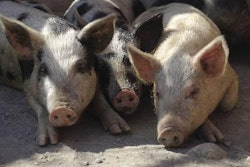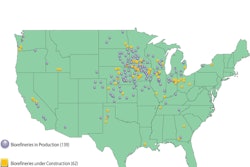The Ohio State University Medical Center issued a press release on June 11, 2008 entitled “Enhanced Chickens, Eggs, May Prevent Breast Cancer”. The report deals with a line of research conducted under the direction of Dr. Young C. Lin, jointly appointed to the Faculty of the Ohio State University College of Veterinary Medicine and the Comprehensive Cancer Center.
Dr. Lin is investigating the incorporation of cottonseed meal extracts, which contain gossypol and its derivatives to hens and broilers to produce eggs and meat containing polyphenol compounds. It is well known that cottonseed meal produces a pink discoloration of the albumen and a brown mottling of egg yolks laid by hens fed diets containing levels of over 3% dietary inclusion. Gossypol is a natural insecticide elaborated by cotton plants which functions as a potent protein kinase C and dehydrogenase enzyme inhibitor.
Administration of the compound in its natural form contained in cottonseed meal is responsible for degeneration of the liver and heart muscle and is extremely toxic to monogastric (single-stomached) livestock.
Gossypol has been investigated for a range of medical applications and is know to inhibit the multiplication of some stages of the malaria parasite. Gossypol is also being evaluated as a natural birth control compound since it effectively inhibits synthesis of the steroid nucleus and accordingly prevents sperm formation and disrupts the female reproduction cycle.
Inhibiting the proliferation of endothelial cells which line blood vessels and hence vascularisation of tissues is among the toxic properties of gossypol. Preventing the growth of blood vessels was key to the anti-angiogenesis approach to treating certain cancers developed by Dr. Judah Folkman during the early 1970’s. Since this time extensive research on the manner in which cancer cells signal endothelial cells to multiply and supply blood to growing tumors has been extensively studied.
Two factors entitled VEGF (Vascular Endothelial Growth Factor) and PDGF (Platelet Derived Growth Factor) have been identified in the sequence of events leading to the proliferation of blood vessels supplying tumors with the nutrients required for growth. Knowledge concerning the mechanism of these “biochemical signalers” has led to two parallel lines of drug development to suppress tumor formation. In 1989 Genentech developed Avastin which is effectively a therapeutic antibody specifically inhibiting VEGF. A second mechanism involves the blocking of receptor molecules which are activated by VEGF and PDGF.
Despite the initial optimism over the application of anti-angiogenesis compounds, actual clinical results have been disappointing. A range of tumors, which respond to these compounds by a reduction in size or stasis in growth, is somewhat limited and at the present time available drugs are used as adjuncts to conventional therapy, which is directed at the destruction of specific cancer cells.
What is disturbing in the press release and from a conversation with the senior author is the implication that feeding hens with extracts of cottonseed meal containing gossypol and its derivatives will produce a compound that has either preventive or therapeutic value when consumed in eggs. The fact that gossypol and derivatives will inhibit angiogenesis under controlled laboratory conditions in tissue culture systems is of biochemical and possibly pharmacologic interest at this stage. Extending this to a manageable therapeutic modality requires a giant leap of faith, which only a researcher oblivious to the realities of current oncology could embrace.
Gossypol derivatives would indeed be non-starters in competition with established, extensively researched drugs approved by the FDA and which have been subjected to clinical validation. It would be virtually impossible to control the level of gossypol intake by patients through consuming eggs or poultry meat. This is an inherent problem analogous to botanical neutraceuticals such as St. Johns Wort, which may have concurrent toxic compounds and show extreme variability in the content of the active agents.
It is understood that the press release was based on preliminary laboratory data intended to support a grant application. Making claims for gossypol or derivatives of the compound as either therapeutic or preventive agents is unjustified. Injudicious and premature releases raise false hope among cancer patients and their families who are constantly bombarded with press reports of “miracle cures”.
A further problem is that the OSU press release associated this project with nutritionally enriched eggs, a rapidly growing segment of the specialty market. It would be detrimental for consumers to acquire the perception that eggs are associated with the treatment of cancer since most of the existing chemo-therapeutic compounds are extremely toxic and produce unpleasant side effects.
The message in this unfortunate episode is that researchers, individually or as teams should be reticent to communicate data and unpublished non-peer reviewed reports to their institutional press offices. Egg Industry is exceptionally careful in disseminating unsolicited press releases. It is our policy that we do not simply reproduce prepared statements from commercial organizations, industry associations, universities and institutions without appropriate review and verification of facts in relation to content and possible implications for the industry and our consumers.

















